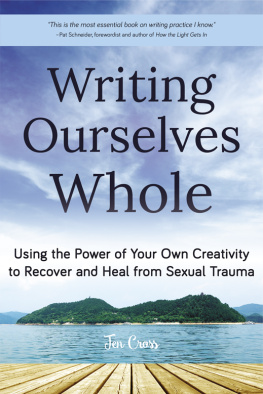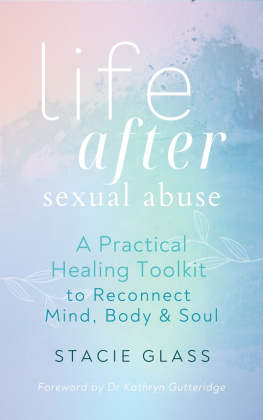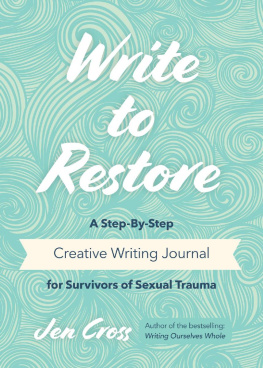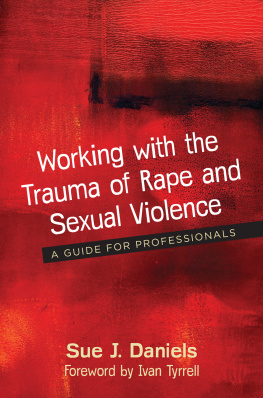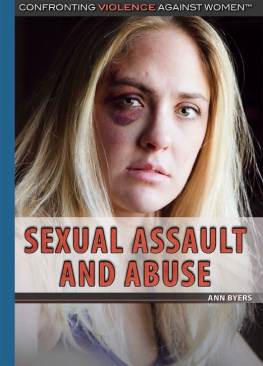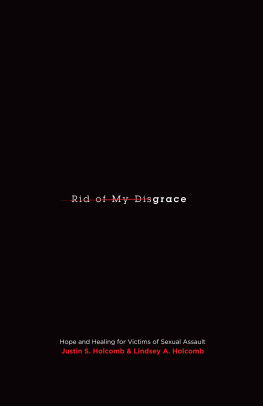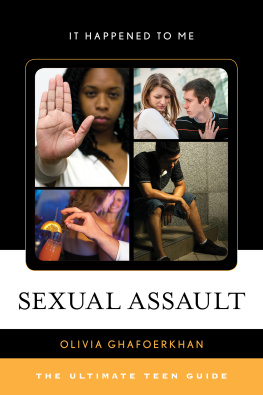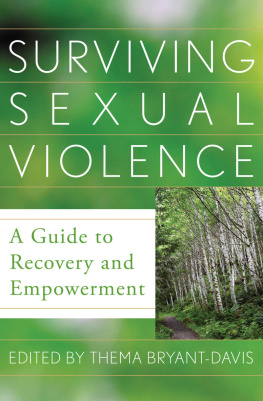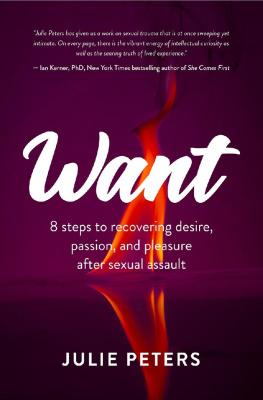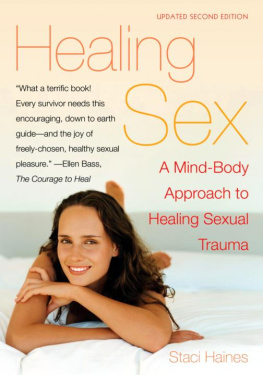
Copyright 2017 Jen Cross
Published by Mango Publishing Group, a division of Mango Media Inc.
Cover Design: Laura Meja
Layout & Design: Morgane Leoni
Mango is an active supporter of authors rights to free speech and artistic expression in their books. The purpose of copyright is to encourage authors to produce exceptional works that enrich our culture and our open society.
Uploading or distributing photos, scans or any content from this book without prior permission is theft of the authors intellectual property. Please honor the authors work as you would your own. Thank you in advance for respecting our authors rights.
For permission requests, please contact the publisher at:
Mango Publishing Group
2850 Douglas Road, 3rd Floor
Coral Gables, FL 33134 USA
For special orders, quantity sales, course adoptions and corporate sales, please email the publisher at or +1.800.509.4887.
Writing Ourselves Whole : Using the Power of Your Own Creativity to Recover and Heal from Sexual Trauma
Library of Congress Cataloging-in-Publication number: 2017911416
ISBN: (paperback) 978-1-63353-619-7 , (ebook) 978-1-63353-620-3
BISAC SEL001000 SELF-HELP / Abuse / Self-Esteem
Printed in the United States of America
For all the survivor-writers
whove risked uncapping their pens
and pouring onto the page
the stories that were never meant to be told.
You broke that isolation open,
and created change in the world
And for Sarah,
who is my heart
Praise
Writing Ourselves Whole is rich, intelligent, passionate, intimate, honest and encouraging. Jen Cross draws from her personal experience, her many years of facilitating writing groups with survivors of sexual abuse, and the wisdom of a variety of teachers and writers, to provide guidance for writingand for lifethats both sensible and inspiring. This book is a treasure trove!
- Ellen Bass, poet and co-author of the ground-breaking The Courage to Heal
Writing Ourselves Whole is a raw, powerful, necessary, wise and practiced guidebook to the revolutionary practice of finding the words, language and voice to transform suffering. It is chock full of insights, exercises, experience and the kind of fierce love and teaching that transforms pain into power. Jen Cross is a brave and brilliant transmitter of the deepest healing and healing practices. To anyone who has experienced abuse, violation and trauma, this book is a way out of the darkness.
Eve Ensler, playwright, performer, and activist, author of the Vagina Monologues, founder of the One Billion Rising campaign
This is the most essential book on writing practice I know.
from the Foreword by Pat Schneider, poet, author, and librettist, founder of the Amherst Writers & Artists writing workshop method
If only my mother had picked up a pen and trusted herself to let the maelstrom of her inner emotions out. If only she could time-travel and step into Jens living room, begin the work of letting her secret self be articulated.
from the Afterword by Carol Queen, author, sexologist, and activist, founder of the Center for Sex and Culture
Writing Ourselves Whole is a profound book of lessons. It teaches the power of taking up space with the most singular of stories (your own), and the power of bearing witness collectively. Jen Cross offers a pathway to find your own truth in writing, and unites us in the transformative power of storytelling.
Amy Scholder
Contents
writing ourselves whole
Pat Schneider
This is the most essential book on writing practice I know. It goes, at great depth and length, into territory that other books, including my own, have treated as important but not as fully-developed methodologies. Those of us who have written about writing, and have included writing as a healing practice, have been waiting for this book. Jen Cross is the perfect author to have created it. Although the central focus here grows out of her own profound experience of sexual abuse, there is little in her content that does not apply to other kinds of trauma. She expands upon the definition of trauma in the Diagnostic and Statistical Manual of Mental Disorders (exposure to actual or threatened death, serious injury or sexual violence. ) She writes: Trauma is a site of shock in the body and/or psyche. Its a rupture, a bifurcation, a disassembly. Trauma marks the moment when what was ended, and something new emerged. Then she asks, But what was the moment of trauma?
This book is about the search for and the uncovering of, that moment: its actuality; its lingering images; its effects in the life of the person who experienced it; and a proven healing methodology: writing. Every writing teacher, writing coach, writing workshop or group leaderand every person with a history of any kind of trauma needs this book. The teachers and guides need it because in every group, class or workshop they lead there will be trauma survivors. Survivors need it because it is a methodology that can be used, as Jen makes clear, alone or in tandem with therapy, counseling, and/or medical interventions.
She suggests that almost everyone has suffered some trauma. We may take trauma into our bodies and lives through our parents physical violence It may be an assault by a stranger, someone who took us by surprise on the street or in our home It may be living under racism, and/or other forms of oppression. It may be living or fighting in a warzone.
I have had in my workshops, and now in my deeply personal friendship, a man who was a survivor of trauma during his youthful years as a medic in the Vietnam war. Our first contact was when he called me to ask if he could join my writing workshop. The leader of the workshop he had been attending asked him not to come any more, because the other members of the workshop could not take what he was writing about.
That silencing, and that silence, is at the heart of Jen Cross book. She brilliantly and explicitly makes clear the mechanisms of silencing at work in sexual predation, as the predator threatens his or her prey in order to protect the predator. But she never forgets the silencing that goes on in relation to other kinds of trauma the reluctance to hear the almost unbearable truths of human cruelty, human suffering.
Yet deeper even than that silencing is the silence of the self, the inability to remember, the unwillingness to revisit old trauma, the fear of what might happen to self or to others if voice was give to old wounds, old pain. Writing alone and/or in a supportive group of peers, Jen makes clear, can be a safe way to open images that had been locked in inner and/or outer silence.
She gives careful attention to the fears of writing that plague most people who try to put pencil to paper, fears that inhibit and often fully prevent artistic creation. In her sections of journaling for her own healing, and in her suggestions, prompts, and helps for her readers, she stresses the crucial importance of what Peter Elbow termed free writing. To write is to enter the mess, is to spill out all your syllables, is to devil the precious eggs everyone else treads so carefully upon. Writing opens the wound, lets in oxygen and releases pus, helps me breathe again, I mean, breathe with gills & webbed toes, breathe against the tide thats coming in, breathe through the mountains of fear I live within . This is what writing does.
Writing Ourselves Whole is a book of many treasures: that lyrical beauty of language; a practical, measured trove of specific helps both for an individual seeker and for a person wanting to create a supportive group for trauma survivors like the ones Jen so clearly describes; and somewhat unexpectedly, pages of what Jen calls delicious body storiesaccounts of workshops dedicated to erotic writing. Through all of this quietly, rather subtly, Jens own story emerges from the beginnings of the abuse she suffered until the dramatic end of it and through her own recovery of self through her writing practice. Sprinkled throughout and condensed near the books end are writing prompts and suggestions for confronting, understanding, and surviving the various stages of recovery.
Next page
